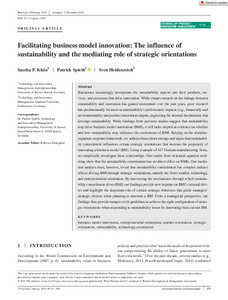| dc.date.accessioned | 2021-05-25T11:43:37Z | |
| dc.date.available | 2021-05-25T11:43:37Z | |
| dc.date.issued | 2021-01-04 | |
| dc.identifier | doi:10.17170/kobra-202105183915 | |
| dc.identifier.uri | http://hdl.handle.net/123456789/12848 | |
| dc.description.sponsorship | Gefördert im Rahmen des Projekts DEAL | ger |
| dc.language.iso | eng | eng |
| dc.rights | Attribution-NonCommercial-NoDerivatives 4.0 International | * |
| dc.rights.uri | http://creativecommons.org/licenses/by-nc-nd/4.0/ | * |
| dc.subject | business model innovation | eng |
| dc.subject | entrepreneurial orientation | eng |
| dc.subject | market orientation | eng |
| dc.subject | strategic orientation | eng |
| dc.subject | sustainability | eng |
| dc.subject | technology orientation | eng |
| dc.subject.ddc | 330 | |
| dc.title | Facilitating business model innovation: The influence of sustainability and the mediating role of strategic orientations | eng |
| dc.type | Aufsatz | |
| dcterms.abstract | Businesses increasingly incorporate the sustainability aspects into their products, services, and processes that drive innovation. While extant research on the linkage between sustainability and innovation has gained momentum over the past years, prior research has predominantly focused on sustainability's performance impacts (e.g., financially and environmentally) and product innovation outputs, neglecting the internal mechanisms that leverage sustainability. While findings from previous studies suggest that sustainability may drive business model innovation (BMI), it still lacks empirical evidence on whether and how sustainability may influence the evolvement of BMI. Relying on the stimulus‐organism‐response framework, we address these shortcomings and argue that sustainability commitment influences certain strategic orientations that increase the propensity of innovating a business model (BM). Using a sample of 167 German manufacturing firms, we empirically investigate these relationships. Our results from structural equation modeling show that the sustainability commitment has no direct effect on BMIs. Our mediation analysis does, however, reveal that sustainability commitment has complex indirect effects driving BMI through strategic orientations, namely the firm's market, technology, and entrepreneurial orientation. By uncovering the mechanisms through which sustainability commitment drives BMI, our findings provide new impetus on BMI’s internal drivers and highlight the important role of certain strategic behaviors that guide managers’ strategic choices when planning to innovate a BM. From a managerial perspective, our findings thus provide mangers with guidelines to achieve the right configuration of strategic orientations when responding to sustainability issues by innovating their current BM. | eng |
| dcterms.accessRights | open access | |
| dcterms.creator | Klein, Sascha Pascal | |
| dcterms.creator | Spieth, Patrick | |
| dcterms.creator | Heidenreich, Sven | |
| dc.relation.doi | doi:10.1111/jpim.12563 | |
| dc.subject.swd | Geschäftsmodell | ger |
| dc.subject.swd | Innovationsmanagement | ger |
| dc.subject.swd | Unternehmen | ger |
| dc.subject.swd | Strategisches Management | ger |
| dc.subject.swd | Technologie | ger |
| dc.subject.swd | Nachhaltigkeit | ger |
| dc.subject.swd | Strukturgleichungsmodell | ger |
| dc.type.version | publishedVersion | |
| dcterms.source.identifier | eissn:1540-5885 | |
| dcterms.source.issue | Issue 2 | |
| dcterms.source.journal | Journal of Product Innovation Management (JPIM) | eng |
| dcterms.source.pageinfo | 271-288 | |
| dcterms.source.volume | Volume 38 | |
| kup.iskup | false | |



